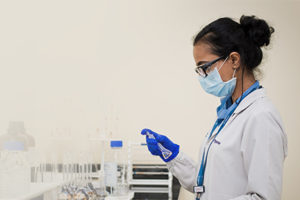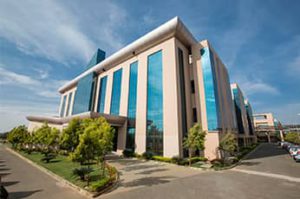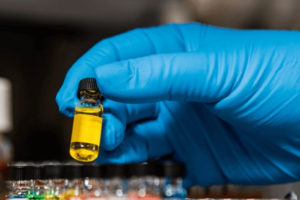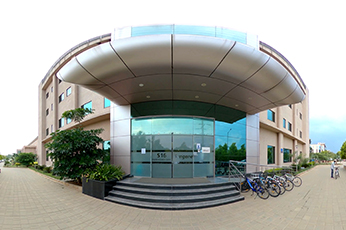Syngene’s exclusive current good manufacturing practices (cGMP) and small molecules manufacturing capabilities allow us to scale-up the manufacturing from laboratory (benchtop) volume to the commercial levels. We follow a phase-appropriate manufacturing philosophy in our facilities, which are compliant with the regulatory guidelines. We have demonstrated capabilities and experience to manufacture batches of small molecule drug substances, advanced intermediates as well as regulatory starting materials for pre-clinical, clinical, and commercial applications at appropriate facilities, and are further expanding our capabilities to cater to growing demand from global innovators in both pharma (Human Health & Animal Health) as well as non-pharma industries.
All our scale-up activities are performed by an experienced team of chemical manufacturing personnel operating 24×7. The team is well-supported by other functions such as quality control, quality assurance, environment health safety and sustainability, engineering and maintenance, and supply chain management. Our uncompromised commitment to safety and regulatory compliance has made us trusted partners of several global customers.
Infrastructure
Located in Bangalore and Mangalore (Southern State of Karnataka, India), Syngene’s dedicated state-of-the-art cGMP manufacturing facilities support the small molecules contract manufacturing business. Since inception, we have successfully supplied clinical (early & late phase) as well as commercial drug substances (NCEs), advanced intermediates, regulatory starting materials and select generic APIs.
Our facility includes equipment of various capacities and materials of construction operating over a wide range of temperatures. We can produce an output from grams to hundreds of kilograms per batch, having generated around 184 tons of materials for various projects since 2015.
We have a dedicated HPAPI cGMP manufacturing facility to handle cytotoxic and cytostatic high potent compounds up to 0.1 µg/m³-8h OEL. The facility includes multiple reactors and downstream equipment, which are housed in standard isolators, to support up to 20 kilograms/ batch.
Our team of highly qualified and experienced technicians operate the facilities in compliance with all safety and regulatory requirements. With a strong emphasis on maintaining quality as well as ensuring the safety of man and material at every stage, all the necessary support functions such as environment, health, and safety (EHS), and maintenance are available on-site.
State-of-the-art equipment
Our manufacturing facilities have different ISO Class 8 certified clean rooms that are segregated into wet and dry processing areas. The wet processing area includes various-sized reactors made of glass, SS314, and Hastelloy, that are controlled through a validated distributed control system (DCS). It also has various Nutsche filters, centrifuges, sparkler filters, and dryers. The dry processing area handles all powder processing and is equipped with the necessary drying, milling, sifting, and packing equipment.
Our facilities can handle both dry and wet milling operations, reducing particle size to as low as 5µ. We have different dryer equipment such as vacuum tray dryers, rotary cone vacuum dryers, and spray dryers. Our milling units include multi mill, pin mill, and wet mill units.
Testing of raw material, in process and finished product related to production is performed at the GMP Quality control laboratories and QC-Microbiology laboratories. We perform both normal-phase and reverse-phase high-performance liquid chromatography (HPLC) purification and separation using Novasep and other chromatographic systems (SS316L and glass columns) in a classified area. We handle cryogenic reactions with temperatures as low as -100°C using different scales and reactors made of SS316L and Hastelloy. Our hydrogenation reactions are also performed in a classified zone to meet various process conditions, volumes ranging from 600 L to 4000 L operating under the pressure up to 20 Barr.
Special features of Syngene’s small molecules contract manufacturing capabilities
World-class facilities
- Existing Bangalore and Mangalore reactor volumes is of > 135,000L (55 reactors)
- In Mangalore site, the slots for additional 70,000L are fully ready with the sufficient utility support already available on-site
- Range of small & large-scale cryogenic reactors (63 L to 12,000L)
- Hastelloy hydrogenators ranging from 600L to 4,000 L (Operating pressure of 20 bar)
- High vacuum (< 10 Torr) & high temperature (140°C) distillations
- HPAPI cGMP manufacturing facility to handle cytotoxic and cytostatic high potent compounds up to 0.1 µg/m³-8h
Operational excellence
- Safety, quality, delivery, engagement, cost, compliance
Strategic sourcing
- In alignment with project planning and inventory control (PPIC )
Culture of safety and accountability EHSS: Kavach program
- Both the manufacturing sites are zero liquid discharge facilities
- In Mangalore commercial manufacturing site, after initial neutralization, the effluent treatment happens on Syngene’s off-site facility located around 2 Kms from on-site facility
Sustainability
- Energy, water, waste management. CSR & governance
Quality management system
- Well established
Regulatory compliance
- Bangalore site is USFDA & PMDA approved. Mangalore USFDA audit is expected 2023
Safety and regulatory compliance
Our manufacturing facilities are equipped with all necessary safety features such as rupture disc/ safety valves for all reactors and process vessels, machine guarding, zero-speed interlock, nitrogen blanketing system, flameproof equipment, and level indicators for storage tanks. We also provide anti-static clothes, packing materials, and ‘touch me pads’ to dissipate static charges.
The plants are designed to ensure compliance with all safety and quality-related regulations. A dedicated production team supported by process engineers, process safety engineers, environment and human health, safety, and security (EHSS), quality assurance (QA), and quality control (QC) teams supervise all production activities. The production team uses an SAP-enabled system to track the progress of all production-related activities from receipt of raw materials to the shop floor, including sampling to QC and the subsequent product release.
Our Bangalore facility has been audited by the United States Food and Drug Administration (USFDA), Pharmaceuticals and Medical Devices Agency (PMDA), and other regulatory bodies with a ‘NO’ observations status. The Mangalore facility is gearing up for first United States Food and Drug Administration (USFDA) expected in the calendar year 2023.
Capabilities
Chemistry capabilities
We have a proven track record of handling a wide range of complex chemical conversions at scale, using various reagents. These conversions include both modern chemistry technologies as well as conventional chemistry conversions such as asymmetric chiral inductions utilizing various asymmetric catalysis, organometallic reagents such BuLi, LDA, Grignard, Turbo Grignard etc. Metal catalyzed C-C bond formations such as Suzuki reaction, Heck reaction, Sonagashira reaction, methylation, halogenation using bromine as a catalyst, cyclopropanation, epoxidation, oxidation and hydrogenation up to 20 Barr pressure.
Process and analytical validation
Syngene is expert in creating a straightforward strategy to perform process validation studies for intermediates, active pharmaceutical ingredients (APIs), and highly potent active pharmaceutical ingredients (HPAPIs) at the right stage of development. We design and control manufacturing processes to ensure that in-process materials and products consistently and reliably meet predetermined quality requirements.
Our scope of activities includes process control justification (PCJ) studies, failure mode and effects analysis (FMEA), analytical method validation, engineering, validation batches, and associated documentation, including all required protocols and reports. We also provide regulatory guidance in setting specifications, method development, and validation, as well as in conducting stability studies.










